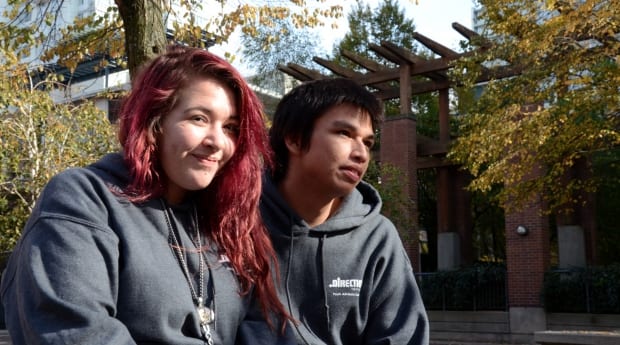It’s a production two years in the making, as a group of Vancouver’s homeless and street-involved youth infused a local activist’s play about homelessness with their own deeply personal stories to bring their characters to life.
In the hands of its young director, Trinity, as well as other members of Directions Youth Services in collaboration with the organization Access to Music, Death in a Dumpster has seen a complete overhaul.
“From the beginning, I told everybody that they should take ownership over their characters, and that actually helped all of them bring their own story,” Trinity says.
The result is a uniquely honest portrait of what life is like for homeless and street-involved youth in Vancouver.
One of the most significant rewrites brought new depth to the character of Josie, played by Kali. (Like Trinity, Kali asked Daily Xtra to only publish her first name since she and the other cast members live in vulnerable and often dangerous situations on the street.)
Originally, Josie was written as a homeless girl, but that depiction was an incomplete portrayal of who is living on Vancouver’s streets, Kali says. So Josie became a transgender sex worker.
“It made that character come alive,” says Kali, who is transgender herself. “A character who’s First Nations, transgender, and a sex worker — that’s something not many people talk about that often.”
“I think for me, the biggest thing is that Josie being a transgender character is going to raise awareness for the transgender community and the fact that a lot of LGBTQ youths end up on the street because there isn’t a safe place for them to go in Vancouver,” she says.
“That’s how they end up in survival sex work, because it’s so hard, and end up drug addicted because they’re trying to hide those feelings.”
According to the McCreary Centre Society’s 2015 survey of homeless and street-involved youth in BC, nearly 40 percent of participants don’t describe themselves as straight — a figure that has nearly doubled since the 2013 survey.
Additionally, three percent of participants identify as either transgender or having a gender identity that falls outside the gender binary.
Kali says the play closely resembles her own experiences, as well those of her friends. Even when the narrative isn’t verbatim — Kali, for example, hasn’t transitioned — she knows the scenes still ring true.
Facing transphobia from family, including the pressure to “man up,” is an all too familiar narrative, she says.
“What I liked about this play is that it reached out to all sorts of different people from different backgrounds — different races, genders, cultures, age groups — and they’re all dealing the same issues: mental health, drug addiction, homelessness,” Trinity says. “It can affect anyone.”
“I’m hoping that we can change people’s perspectives on the types of street involvement and homelessness — we’re actually people, too,” Kali says. “Everyone just disposes street-involved and homeless youth. Everyone just walks by.
“I think this will really show an aspect of, like, we have talent, we’re able to bring each other together, and we’re not just garbage like everyone thinks we are. We’re people, too. We could be anyone’s son or daughter.”
“These stories are important,” she continues. “That’s one thing I really believe in: stories. Everyone has stories to tell and everyone has chapters to close and chapters to open. I think that people should come see it and embrace the stories that are out there.”
Death in a Dumpster
Saturday, Nov 7, 2015, $50, with proceeds to Directions Youth Services
Wednesday, Nov 11 and Saturday, Nov 14, $20
Waterfront Theatre, 1412 Cartwright St, Granville Island, Vancouver
8pm
Tickets and more information at deathinadumpster.ca

 Why you can trust Xtra
Why you can trust Xtra


